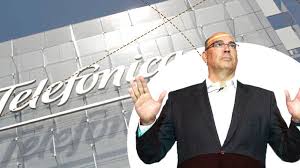A revolution at the top of Telefonica forced the departure of the committee of four senior managers, while Emilio Gayo was placed as president of Telefónica Spain to replace Luis Miguel Gilpérez. The highlight of this restructuring is the departure of Ramiro Sánchez de Lerín from the general secretariat of the company, replaced by Pablo Carvajal.
Sánchez de Lerín was the last heavyweight of the previous leadership of the mandate of César Alierta (In TVMAS we interviewed him several times) and he is the one who knows even the deepest secrets of the company and maintained his position, despite being investigated in the scandalous Rato case.
In November, the Provincial Court of Madrid said to maintain the investigation of the Secretary general of Telefónica (Sánchez de Lerín) as a separate piece for possible corruption in the hiring of the former minister as advisor to Telefónica “in order to circumvent the Rodrigo Rato tax burden,” explained the statement.
The reality is that Gayo became the strong man of Telefónica Spain after the restructuring carried out by GilPérez himself in 2013 when the wager for Movistar Fusión arrived and that at the time seemed a risk.
He created the figure of delegated councillor (COO) of Telefonica Spain, with María Jesús Almazor, until now director of the Southern Territory of Telefonica Spain.
Others who left the executive committee are Carlos López Blanco, (general Director of Public Affairs and Regulation); whereas Bernardo Quinn stopped being global head of Human Resources. Marta Machicot, who will be a part of the Executive Committee, was appointed as head of this directorate.
The Latin American division dispenses with Eduardo Caride and is divided in two, one with Alfonso Gomez Palacio, former president of Telefonica Colombia, to deal with Telefonica Hispam Norte (Colombia, Mexico, Central America, Ecuador and Venezuela) and the other with Quinn at the head of Telefonica Hispam Sur (operations in Argentina, Chile, Peru and Uruguay).
According to the communicate, this new structure seeks to “simplify and adapt to the digital world.” In this sense, the CEO of Telefónica, José María Álvarez-Pallete, has highlighted that the digital world demands the company “a permanent renewal.” So we anticipate in TVMAS that changes will be the only permanent.

